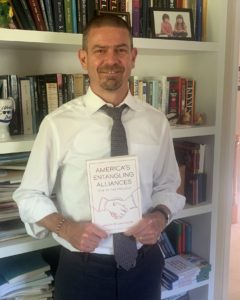
Professor of Political Science and International Affairs Jason Davidson with his book, “America’s Entangling Alliances: 1787 to the Present.”
Professor of Political Science and International Affairs Jason Davidson’s book, America’s Entangling Alliances: 1778 to the Present, recently received a positive review essay in H-Diplo, a well-respected digital international relations publication.
Teachers of United States foreign relations know that the myth of isolationism is strong among their students. The axioms of presidents George Washington and Thomas Jefferson about steering clear of permanent and entangling alliances hold great power in the discourse of U.S. history. Modern scholarship, though, shows clearly that the U.S. has long engaged in active and often complex foreign relations with the wider world in pursuit of real or perceived national interests: from war and peace with indigenous peoples in North America since the colonial era to missile strikes in the Middle East under modern Republican and Democratic administrations. Many of these actions were often unilateral, but alliances and other agreements with other countries like France in 1778 or Latin American states in 1823 or the United States’ twentieth century coalitions were not unusual. For scholars today, the question is not so much ‘did the U.S. entangle itself with others’ but ‘how’ and ‘why.’
Jason W. Davidson’s America’s Entangling Alliances: 1778 to the Present is a useful addition to this scholarship and a good tool for teachers and researchers alike. Written from a decidedly political science perspective. Davidson engages in a meaningful way with the more recent standard U.S. foreign relations historiography, especially surveys by scholars and writers like George Herring, Walter McDougall, and Walter Russell Mead. Refreshingly, Davidson makes use of a variety of published primary sources and online archival resources to ground his analysis in an evidentiary record historians will appreciate. Read more.